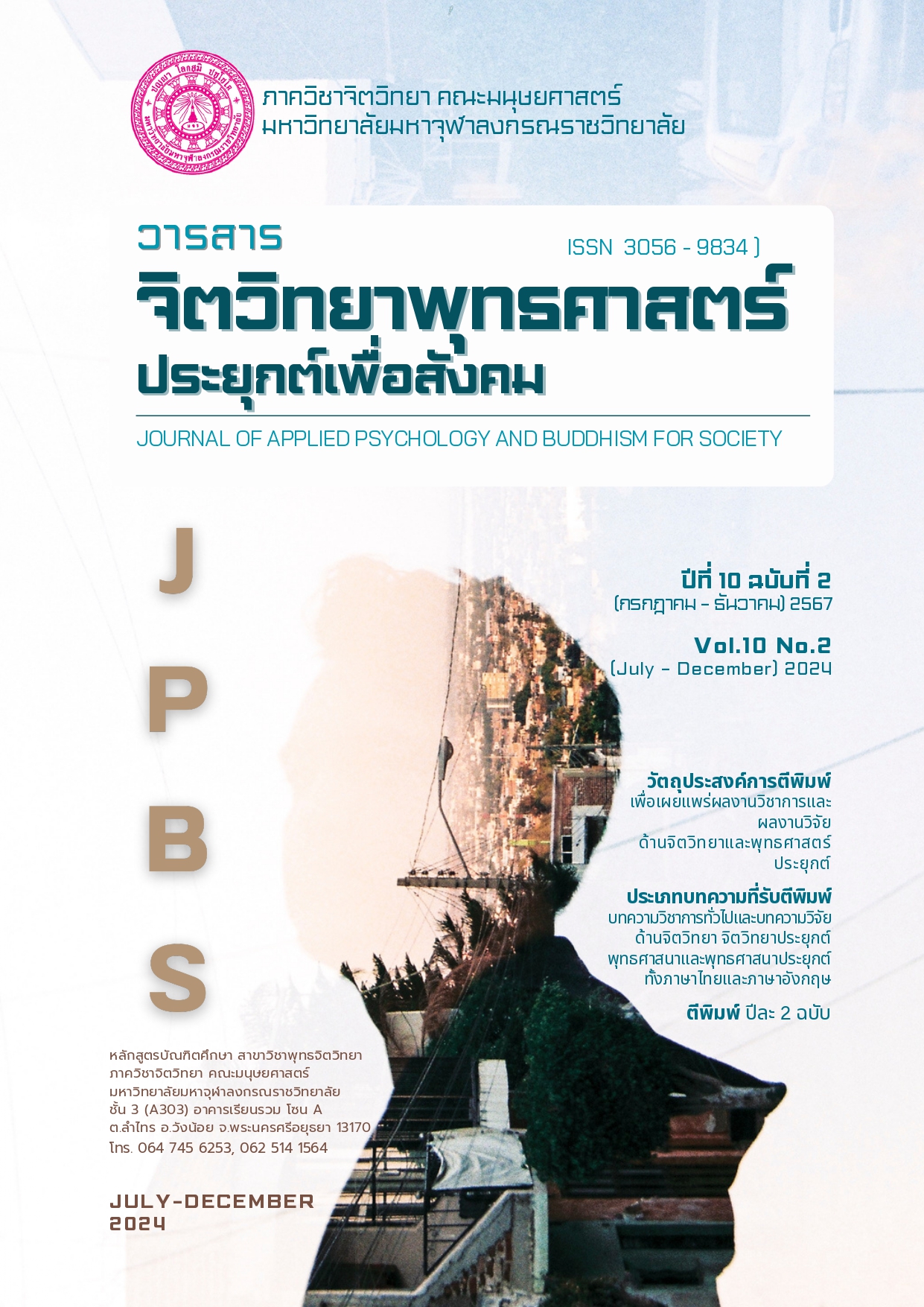ปัจจัยเชิงพุทธจิตวิทยาที่ส่งผลต่อประสิทธิภาพการปฏิบัติงานของบุคลากรองค์การบริหารส่วนจังหวัด
คำสำคัญ:
จิตวิทยาเชิงบวก, ประสิทธิภาพ, บุคลากรในองค์กร, ปัจจัยทางจิตวิทยา, องค์การบริหารส่วนจังหวัดบทคัดย่อ
การวิจัยครั้งนี้ มีจุดมุ่งหมาย 1. เพื่อศึกษาแนวคิดปัจจัยพุทธจิตวิทยาส่งผลต่อประสิทธิภาพการปฏิบัติงานของบุคลากรองค์การบริหารส่วนจังหวัด 2. เพื่อศึกษาปัจจัยเชิงพุทธจิตวิทยาที่ส่งผลต่อประสิทธิภาพการปฏิบัติงานของบุคลากรองค์การบริหารส่วนจังหวัด 3. เพื่อนำเสนอปัจจัยพุทธจิตวิทยาที่ส่งผลต่อประสิทธิภาพการปฏิบัติงานของบุคลากรองค์การบริหารส่วนจังหวัด เป็นการวิจัยแบบผสานวิธี (Mixed methods research) ประกอบด้วย วิจัยเชิงปริมาณและวิจัยเชิงคุณภาพ โดยการศึกษาค้นคว้าเอกสาร การสัมภาษณ์เก็บข้อมูลจากผู้เชี่ยวชาญ จำนวน 17 คน เพื่อสร้างเครื่องมือแบบสอบถามและการสนทนากลุ่มโดยผู้ทรงคุณวุฒิ จำนวน 10 คน ทำการเก็บรวบรวมข้อมูล ประชากรและกลุ่มตัวอย่างเป็นบุคลากรองค์การบริหารส่วนจังหวัดนครราชสีมา จำนวน 204 คน การวิเคราะห์ข้อมูล ได้แก่ ค่าความถี่ ค่าเฉลี่ย ค่าร้อยละ ค่าเบี่ยงเบนมาตรฐานและการวิเคราะห์ถดถอยพหุคูณ (Multiple Regression)
ผลการวิจัยพบว่า 1. ผลการศึกษาปัจจัยพุทธจิตวิทยาที่เกี่ยวข้องประสิทธิภาพการปฏิบัติงานของบุคลากรองค์การบริหารส่วนจังหวัด คือ หลักอิทธิบาท 4 ได้แก่ ฉันทะ วิริยะ จิตตะ วิมังสา กับ หลักทางจิตวิทยาเชิงบวก คือ การรับรู้ศักยภาพของตนเอง การมีความหวัง มองโลกในแง่ดีและมีความยืดหยุ่น ได้ศึกษาด้านองค์ประกอบ ปัจจัย หลักธรรม หลักจิตวิทยา การบูรณาการหลักเชิงพุทธจิตวิทยาและผู้บริหารองค์กรกับบทบาทส่งเสริมความสำเร็จบุคลากร ผลการศึกษาแสดงให้เห็นว่าปัจจัยเชิงพุทธจิตวิทยามีความเกี่ยวข้องเป็นแนวทางส่งเสริมประสิทธิภาพของการปฏิบัติงานของบุคลากรองค์การบริหารส่วนจังหวัด 2. ผลการศึกษาปัจจัยเชิงพุทธจิตวิทยาที่ส่งผลต่อประสิทธิภาพการปฏิบัติงานของบุคลากรองค์การบริหารส่วนจังหวัด พบว่า ภาพรวมประสิทธิภาพของบุคลากร อยู่ในระดับมาก ( = 4.44) พิจารณารายด้าน ด้านที่มีค่าเฉลี่ยมากที่สุด คือ ด้านเวลางาน (
= 4.48, S.D.= 0.48) รองลงมา คือ ด้านด้านคุณภาพงาน (
= 4.47, S.D.= 0.44) และ ด้านปริมาณงาน (
= 4.38, S.D.= 0.54) ผลการเปรียบเทียบ ปัจจัยเชิงพุทธจิตวิทยาที่ส่งผลต่อประสิทธิภาพการปฏิบัติงานของบุคลากร มีค่าเฉลี่ยภาพรวมมากที่สุด คือ หลักอิทธิบาท 4 อยู่ในระดับมาก (
= 4.30, S.D. = 0.69) รองลงมา คือ จิตวิทยาเชิงบวก มีค่าเฉลี่ยอยู่ในระดับมาก (
= 4.21, S.D. = 0.72) ตามลำดับ ผลการวิเคราะห์แสดงให้เห็นว่าปัจจัยเชิงพุทธจิตวิทยาส่งผลต่อประสิทธิภาพการปฏิบัติงานของบุคลากร 3. ผลการวิเคราะห์การถดถอยพหุคูณ พบว่า หลักอิทธิบาท 4 มีอิทธิพลต่อประสิทธิภาพการปฏิบัติงานของบุคลากรองค์การบริหารส่วนจังหวัด R2 = 0.5 นัยสำคัญทางสถิติที่ .05 และจิตวิทยาเชิงบวกมีอิทธิพลต่อประสิทธิภาพการปฏิบัติงานของบุคลากรองค์การบริหารส่วนจังหวัด R2 = 0.6 มีนัยสำคัญทางสถิติที่ .05 จากผลสถิติยืนยันได้ว่าสามารถสร้างความสัมพันธ์กับตัวแปรต้นและตัวแปรตามได้
เอกสารอ้างอิง
Cheung, Francis et al. (2011). Psychological Capital as a Moderator Between Emotional Labor, Burnout, and Job Satisfaction among School Teachers in China. International Journal of Stress Management, 18(4), 348.
Department of Local Administration. (2018). income data of local government organizations for fiscal year 2018. Retrieved June 9, 2024, from http://www.dla.go.th/work/money/index.jsp
Macey, W. H., & Schneider, B. (2008). The meaning of employee engagement. Industrial and Organizational Psychology, 1(1), 3-30.
Masten, A. S., & Reed, M.-G. J. Resilience in development. In C. R. Snyder & S. J. Lopez (Eds.). (2002). Handbook of positive psychology. Oxford University Press.
Office of Local Administration Promotion. (2024). basic information Local Administrative Organization of Nakhon Ratchasima Province. Retrieved May 9, 2024, from https://www.koratdla.go.th/public/list/data/detail/id/44665/menu/1682/page/1
“_______”. (2024). local government organization information. Retrieved May 9, 2024, from http://www.dlago.th/work/abt/
Seligman, M. E.P. (1991). Learned optimism: How to Change your mind and your life. New York: Pocket.
Suthinee Rerkkham. (2021). Strategic Human Resource Acquisition in an Era of Disruption. Bangkok: Chulalongkorn University Press.
ดาวน์โหลด
เผยแพร่แล้ว
รูปแบบการอ้างอิง
ฉบับ
ประเภทบทความ
หมวดหมู่
สัญญาอนุญาต
ลิขสิทธิ์ (c) 2024 วารสารจิตวิทยาพุทธศาสตร์ประยุกต์เพื่อสังคม

อนุญาตภายใต้เงื่อนไข Creative Commons Attribution-NonCommercial-NoDerivatives 4.0 International License.






